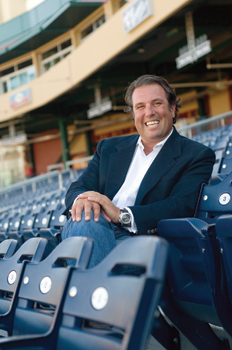The ownership group behind the Class AAA Reno (Nevada) Aces is raising a $100 million equity fund to buy up to seven more Minor League Baseball teams.
The fund, titled Manhattan Capital Sports Acquisition, already has $20 million and is in the process of buying the Class A Bowling Green (Ky.) Hot Rods.
The only other large-scale minor league rollup is Mandalay Baseball Properties, which owns four teams and has half-ownership of a fifth. But team prices are far higher now than when Mandalay got started more than a decade ago, with Class AAA teams currently selling for a minimum of $25 million. Earlier this year, Seaport Capital, which holds a majority share in the Mandalay group, announced that it was selling that stake.
“From a fund perspective, the risk basis, your downside is very well protected if you look historically at how these teams have appreciated,” said Stuart Katzoff, who with his father, Jerry, owns a chain of restaurants and real estate properties. “Just the Reno team has doubled in asset
 |
Stuart Katzoff, already an owner of the Reno Aces, will oversee the new equity fund’s assets.
Photo by: DAVID CALVERT / RENO ACES (2)
|
value since we bought it in 2007, and that was in a down economy.”
Citigroup is advising the Katzoffs. The sports fund will be a subgroup of Katzoff’s larger Manhattan Capital investment firm. The junior Katzoff will focus on the sports assets.
The advisory board for the new group includes Derrick Hall, Arizona Diamondbacks president (the Aces are the D-Backs’ AAA affiliate); Herb Simon, Indiana Pacers owner and an investor in the Aces; Jon Orszag and Doug Band, two former advisers to President Bill Clinton; and Gary Weinstein, the former COO of Providence Equity.
While private equity is more common farther up the food chain in professional sports, it has dipped its toe into niche sports. For example, the Professional Bull Riders is owned by an equity fund, Spire Capital, and the Ironman brand is owned by Providence Equity.
Minor League Baseball attracts more than 40 million fans annually, but there are risks. The sport is hyper-local, meaning a given team can struggle based on a blip in the economy or proximity to other sports teams.
“They have traditionally been tough investments,” said David Moross, founder, chairman and CEO of Falconhead Capital, speaking about funds targeted at very small companies such as a Minor League Baseball team. “Micro-funds are tough to raise right now.”
That said, Katzoff is confident enough that he is promising his investors returns each year based on the teams’ cash flows. In this fashion, Manhattan Capital is a cross between a traditional equity fund, which pays 20 percent of profits to management, and a real estate investment trust, which makes annual cash flow payments to investors.
Katzoff noted that there are economies of scale in owning multiple teams, including in the areas of concessions and merchandise.
Minor League Baseball economics are attractive in large part because the teams’ affiliated MLB clubs pay the player costs, removing the principal expense. However, new owner approvals are challenging, Katzoff said, because they must go all the way to the MLB office in New York.
Minor League Baseball allows clubs to borrow 45 percent of their value, so Manhattan Capital anticipates borrowing up to $45 million on its $100 million fund, presuming it gets to that amount. That would mean the fund has $145 million to make acquisitions. Katzoff said Class A teams are selling for between $7 million and $11 million; a source said the Bowling Green club is selling for $8.5 million. (Representatives for the Hot Rods, owned by DSF Sports and Entertainment, were not immediately available for comment.) Additionally, Class AA teams are selling at between $18 million and $25 million, Katzoff said, and Class AAA teams are valued at $25 million to $30 million.





